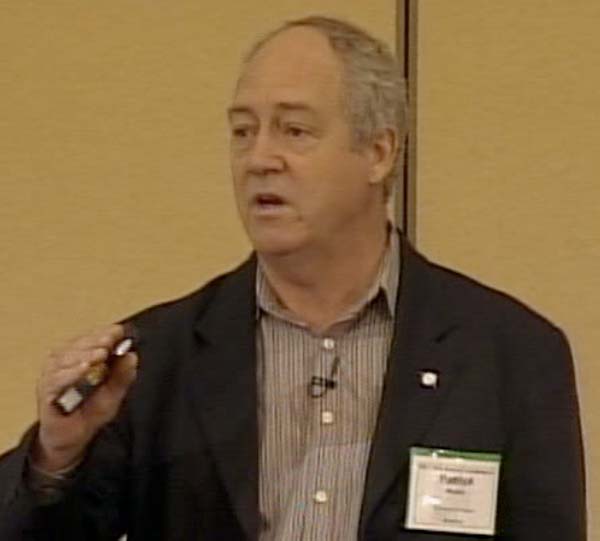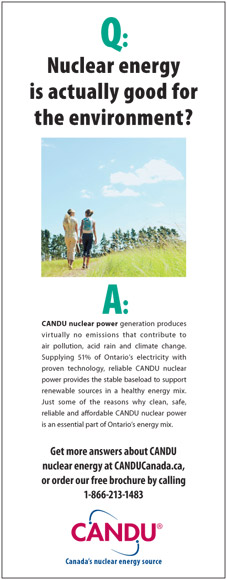Submitted by Bob Burton on
 "Much of the environmental movement, including Greenpeace, has lost its way when it comes to nuclear power, caught up in politically correct ideology and stooping to sensationalism to garner support," declared a recent media alert announcing the visit of one-time Greenpeace activist Patrick Moore to Toronto. The alert continued, "In Ontario, CANDU nuclear energy is the greatest single contributor to carbon reduction relative to all other energy producing technologies."
"Much of the environmental movement, including Greenpeace, has lost its way when it comes to nuclear power, caught up in politically correct ideology and stooping to sensationalism to garner support," declared a recent media alert announcing the visit of one-time Greenpeace activist Patrick Moore to Toronto. The alert continued, "In Ontario, CANDU nuclear energy is the greatest single contributor to carbon reduction relative to all other energy producing technologies."
The alert, which was distributed by Laurie Weir and Josh Turner from the Canadian PR company Trillium Corporate Communications, prominently featured Moore's claim that was a "founding member" of Greenpeace. It didn't mention who was sponsoring his tour or that Moore works as a consultant to the Nuclear Energy Institute in the U.S. The day following the Toronto event, Moore promoted nuclear power at an event hosted by the Saskatoon Chamber of Commerce in the province of Saskatchewan.
The debate over nuclear power and uranium mining involves major questions of potentially massive economic costs to consumers and taxpayers, the safety of the population, the potential for weapons proliferation, the creation of a long-term radioactive legacy and significant impacts on indigenous communities. With such potentially large downsides, probing journalism is essential to ensure that citizens can make informed choices rather than be served a diet of nuclear industry spin dressed up as news.
Of course, any journalist with internet access would be easily able to check out a little on Moore's background, his history of nuclear advocacy and ask some questions about who exactly he was working for. After all, the Canadian Association of Journalists statement of principles sets out that journalists "will report all relevant facts in coverage of controversies or disputes." But how often does this happen?
Sponsors, What Sponsors?
So how did those who reported on Moore's Canadian tour fare?
- Reporting for 600 Action News-Local First, Jim Mattern didn't perform too well. Up front Mattern described Moore as an "environmentalist" and repeated without question Moore's disputed claim that he was a "founding member" of Greenpeace. (The actual founders of Greenpeace insist that Moore arrived on the scene two years after the group was created.) How about who was sponsoring his trip to chat to the Saskatoon Chamber of Commerce? Not a word. What about his work for the U.S. nuclear industry? Nup. Any alternative points of view? Nup. The headline on the story -- "Environmentalist Proposes Nuclear Power Plant" -- is the sort of headline PR professionals could only dream of.
-
Over at the Canadian Broadcasting Corporation (CBC), Moore didn't get away with quite so much. There was no echoing of Moore's "founding member of Greenpeace" claim. Instead they used the more accurate tag that he is a "former Greenpeace activist and nuclear power advocate." At the end of the story they also mentioned that in 2006 Moore was hired as the co-chair of "the pro-nuclear public relations campaign, the Clean and Safe Energy Coalition" which is accurately described as being funded by the Nuclear Energy Institute, "the trade association for companies that operate nuclear reactors." So far so good.
One of Moore's gripes, the CBC reported, is that Saskatchewan mines and exports uranium but doesn't have a nuclear power station itself. As for alternative points of view, CBC only got as far as including a comment from Glen Viekle, the deputy minister of the Industry and Resources Department, who described the province's commitment to expand renewable power sources and uranium mining. If there is anyone in Saskatchewan who doesn't support both an expansion of uranium mining and the establishment of a nuclear power station, no one got to hear about it in that story. And there is no indication that Moore was even asked who it was that sponsored his trip to Canada.
-
The Leader Post, a newspaper published in Saskatchewan's capital Regina, covered the same event but quite differently. Moore, Cassandra Kyle wrote, is a "popular environmentalist" and "former president of Greenpeace Canada and founder of Greenspirit, an environmental consultancy" firm. While his popularity and the description of him as an "environmentalist" are arguable, it is true that he was President of Greenpeace in Canada at one time and that he founded his own consultancy company, Greenspirit. "Moore admits he was opposed to nuclear energy during his Greenpeace years, but changed his mind after researching the power source. The environmentalist hopes more people take a closer look at nuclear energy, saying general uncertainties about the fuel comes from concerns over nuclear waste, meltdowns and proliferation, all of which are not likely to happen or cause damage," Kyle writes. It is all very well for Moore to sell his reassuring message but if he is a consultant, who is his client? On this point, Kyle provides no detail and didn't even get as far as mentioning that he is a nuclear industry consultant south of the border.
Still, Kyle's report did include four other points of view: Armand Laferrere, the president of the nuclear reactor company Areva Canada Inc., unsurprisngly saying he'd like to see one of his company's reactors in the province; Larry Hiles from the Saskatchewan Economic Development Association (SEDA) endorsing the idea of the nuclear plant in the province; the leader of the Green Party, Elizabeth May, opposing uranium mining; and a brief summary of why Greenpeace opposes nuclear power.
Undoubtedly there was other coverage of Moore's tour that is not available online. But if the sample above is anything to go by, the sponsors of Moore's Canadian tour would be pleased. None of the news reports address the basic question of who sponsored Moore's tour despite the stated standard that journalists should report "all relevant facts in coverage of controversies or disputes."
Mattern's report was a sample of a single source story and journalism as stenography. The CBC's report at least disclosed Moore's U.S. nuclear consultancy work but presented the debate as being between those who wanted more uranium mining and those who wanted both uranium mining and nuclear power. While Kyle represented a broader spectrum of the debate over nuclear power and uranium mining, she uncritically portrayed Moore as a former Greenpeace leader who has seen the nuclear light and is speaking out from personal conviction, completely independent from who signs his paychecks.
The Untold Story
 If Canadian journalists didn't ask who was sponsoring Moore's tour, would the good folks down at Trillium Corporate Communications disclose who their client was? In response to a query from the Center for Media and Democracy (CMD), Trillium's Josh Turner readily disclosed that Moore's Toronto event was sponsored by Team CANDU, a consortium of nuclear power station companies including the publicly-owned Atomic Energy of Canada Ltd (AECL).
If Canadian journalists didn't ask who was sponsoring Moore's tour, would the good folks down at Trillium Corporate Communications disclose who their client was? In response to a query from the Center for Media and Democracy (CMD), Trillium's Josh Turner readily disclosed that Moore's Toronto event was sponsored by Team CANDU, a consortium of nuclear power station companies including the publicly-owned Atomic Energy of Canada Ltd (AECL).
However, Turner said, Trillium wasn't involved in the Saskatoon event. Kent Smith-Windsor, the Executive Director of the Saskatoon Chamber of Commerce, told CMD that he didn't know who sponsored Moore's visit to Saskatoon. His group was simply asked if they would like to host a luncheon talk when Moore was in town for the Economic Developers Association of Canada (EDAC) 2007 conference a few days earlier.
The EDAC conference was hosted by the Saskatchewan Economic Development Association, which is headed by Verona Thibault. Thibault promptly responded to an email query from CMD, explaining that the uranium mining company AREVA Resources Canada and the uranium mining company Cameco Corporation had both sponsored Moore's visit. (Cameco also a minority interest in a nuclear power station in Ontario.)
Two phone calls and one email -- ten minutes work all told -- revealed the sponsor of Moore's pro-nuclear events in Canada. Why didn't any of the Canadian reporters manage to do this small amount of digging?
As many in the PR trade know only too well, successful PR often relies on lazy journalism. The third-party technique -- in which a seemingly independent person or group is used to promote a sponsor's message -- can be successful in one of two ways. The first and riskier approach is where the third party or their sponsor denies any funding or other connection and relies on journalists or citizens not being able to unearth evidence to the contrary. The second approach is where the third party or sponsor opts not to actively disclose the connection, in the hope that journlists will not ask. Either way the public is deceived.
The failure of the sampled reports to even include some simple original research and ask about who was sponsoring Moore's tour raises doubts about whether much of the Canadian media is up to the task of unearthing important but harder to obtain information on the nuclear industry. If Canadian reporters can't ask the basic questions on a topic as important as proposals for a massive expansion of the nuclear industry, what can they be relied to report on?
There is one thing that might console Canadian reporters and their readers. U.S. news media haven't done any better in reporting on Moore's or his colleague Christine Todd Whitman's nuclear industry ties.
Bob Burton is the managing editor of SourceWatch.
One of the purposes of SourceWatch, the Center for Media and Democracy's online database that anyone can add to, is to document the past and present campaigns of the nuclear industry. Our aim is to ensure that anyone with Internet access can find detailed, referenced information on the campaigns of the nuclear industry. We'd love to have you join us. You can become a SourceWatch volunteer contributor and add to or edit articles. It's free, easy and fun.
